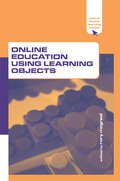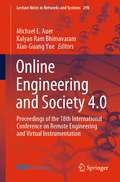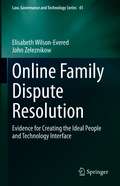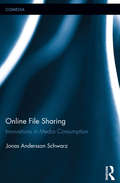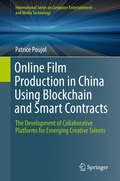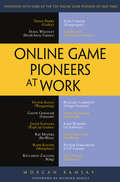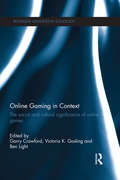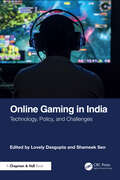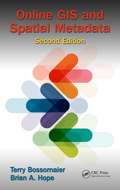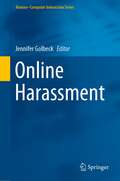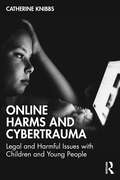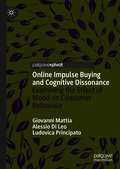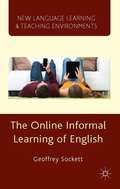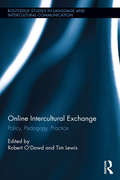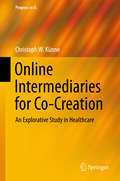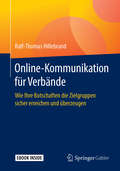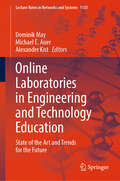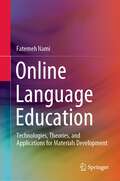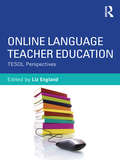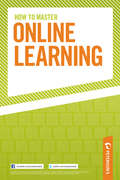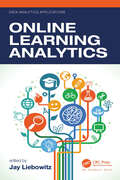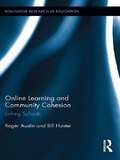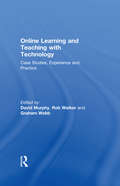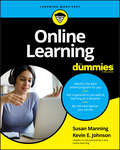- Table View
- List View
Online Education Using Learning Objects (Open and Flexible Learning Series)
by Rory McGreal'E-learning is integral to on-site education institutions worldwide, and the rapid explosion of interest in the subject means that this timely, cutting-edge book will be an instant and indispensable resource. Among educators, the development of reusable learning objects made accessible via the internet is ever more important to teaching and learning. This book provides a comprehensive look at a state-of-the-art online education, and presents advice on the creation, adaptation and implementation of learning objects and metadata. Including articles written by some of the leading innovators in the field, this book takes the reader through: designing effective learning objects; creating learning objects; transforming existing content into reusable learning objects; building a metadata management system. This book will be essential reference material for learning technologists, course developers at learning institutions, postgraduate students, teachers and learners in the field of e-learning.'
Online Engineering and Society 4.0: Proceedings of the 18th International Conference on Remote Engineering and Virtual Instrumentation (Lecture Notes in Networks and Systems #298)
by Michael E. Auer Kalyan Ram Bhimavaram Xiao-Guang YueThis book presents the general objective of the REV2021 conference which is to contribute and discuss fundamentals, applications, and experiences in the field of Online and Remote Engineering, Virtual Instrumentation, and other related new technologies like Cross Reality, Data Science & Big Data, Internet of Things & Industrial Internet of Things, Industry 4.0, Cyber Security, and M2M & Smart Objects. Nowadays, online technologies are the core of most fields of engineering and the whole society and are inseparably connected, for example, with Internet of Things, Industry 4.0 & Industrial Internet of Things, Cloud Technologies, Data Science, Cross & Mixed Reality, Remote Working Environments, Online & Biomedical Engineering, to name only a few.Since the first REV conference in 2004, we tried to focus on the upcoming use of the Internet for engineering tasks and the opportunities as well as challenges around it. In a globally connected world, the interest in online collaboration, teleworking, remote services, and other digital working environments is rapidly increasing. Another objective of the conference is to discuss guidelines and new concepts for engineering education in higher and vocational education institutions, including emerging technologies in learning, MOOCs & MOOLs, and Open Resources.REV2021 on "Online Engineering and Society 4.0" was the 17th in a series of annual events concerning the area of Remote Engineering and Virtual Instrumentation. It has been organized in cooperation with the International Engineering and Technology Institute (IETI) as an online event from February 24 to 26, 2021.
Online Family Dispute Resolution: Evidence for Creating the Ideal People and Technology Interface (Law, Governance and Technology Series #45)
by Elisabeth Wilson-Evered John ZeleznikowThis book brings together the expertise of two authors involved in initiating the development of Online Family Dispute Resolution (OFDR), while also examining the unique Australian system. The family arena generally comprises property or child-related disputes arising between parents, whether married or not, and whether the parties have lived together or not. A special feature of Australia’s OFDR system is that it deals with children’s issues rather than focusing on property distribution. The book first discusses how technological innovations have transformed dispute resolution services to families. It explores the need for OFDR and how such systems can potentially be implemented. In turn, the coverage shifts to screening tools used prior to a Family Dispute Resolution session to ensure that online systems are appropriate for the case under dispute and the people involved. Readers will then learn about the necessary training required – for administrators, practitioners and clients alike - for OFDR to be successful. In addition, the book offers a comprehensive evaluation of the system and reflects on the lessons learned to date. In closing, it suggests ways in which OFDR could be further developed and applied to family disputes around the world.
Online File Sharing: Innovations in Media Consumption (Comedia)
by Jonas Andersson SchwarzIt is apparent that file sharing on the Internet has become an emerging norm of media consumption—especially among young people. This book provides a critical perspective on this phenomenon, exploring issues related to file sharing, downloading, peer-to-peer networks, "piracy," and (not least) policy issues regarding these practices. Andersson Schwartz critically engages with the justificatory discourses of the actual file-sharers, taking Sweden as a geographic focus. By focusing on the example of Sweden—home to both The Pirate Bay and Spotify—he provides a unique insight into a mentality that drives both innovation and deviance and accommodates sharing in both its unadulterated and its compliant, business-friendly forms.
Online Film Production in China Using Blockchain and Smart Contracts: The Development of Collaborative Platforms for Emerging Creative Talents (International Series on Computer Entertainment and Media Technology)
by Patrice PoujolThis book explores the use of Blockchain and smart contract technologies to develop new ways to finance independent films and digital media worldwide. Using case studies of Alibaba and in-depth, on-set observation of a Sino-US coproduction, as well as research collected from urban China, Hong Kong, Europe, and the USA, Online Film Production in China Using Blockchain and Smart Contracts explores new digital platforms and what this means for the international production of creative works. This research assesses the change in media consciousness from young urban audiences, their emergence as a potential participative and creative community within dis-intermediated, decentralised and distributed crowdfunding and crowdsourcing models. This research proposes solutions on how these young emerging local creative talents can be identified and nurtured early on, particularly those who now produce creative and artistic audiovisual content whether these works are related to film, Virtual Reality (VR), video game, graphic novels, or music. Ultimately, a new media content finance and production platform implementing blockchain is proposed to bring transparency in the film sector and open doors to emerging artists in digital media. Appropriate for both professionals and academics in the film industry as well as computer science.
Online Game Pioneers at Work
by Morgan RamsayIn this groundbreaking collection of 15 interviews, successful founders of entertainment software companies reflect on their challenges and how they survived. You will learn of the strategies, the sacrifices, the long hours, the commitment, and the dedication to quality that led to their successes but also of the toll that this incredibly competitive market has on even its most brilliant minds. For the hundreds of thousands of game developers out there, this is a must read survival guide. For those who simply enjoy games and know of some of these founders, this will be a most interesting read. Sales of video games, hardware, and accessories reach upwards of $20 billion every year in the United States alone, and more than two-thirds of American households include video games in their daily lives. In a world that seems to be overflowing with fortune and success, the vicious truth of this booming industry is easily forgotten: failure is tradition. Video games define a cultural crossroad where business, entertainment, and technology converge, where the risks are great, cutting edge technology is vitally important and competition is intense. Here are the stories of survival from many of the industries luminaries who founded companies, created industries in their home countries, took amazing risks, innovated technologies, and invented new ways to sell. Among this outstanding group of pioneers are Richard Garriott, founder of Origin, astronaut, and the producer of the revolutionary Ultima Online, John Romero of Doom, Wolfenstein and Quake fame, and Victor Kislyi whose World of Tanks set the Guinness world record for the most people online at once with over 1. 1 million people playing). You will read their stories and you will gain an understanding of how they managed in such a demanding business. There are a few game development companies that have withstood the test of time; most startups exit as quickly as they enter the scene. Many firms are outpaced by the explosive worldwide growth and economic realities of the sector. Here are enlightening the stories of entrepreneurs who found success and many who subsequently could not repeat it. They walk you through their incredible journeys of success and failure while expressing their views on development, design, hiring, finance, business models, selling their organization, the business life cycle, their frustrations and mistakes, while showing their intensity and their passion for the business along the way. Online Game Pioneers at Work: Explores the formation of entertainment software companies from the perspectives of successful founders who defied the odds Provides insight into why experienced professionals sacrifice the comfort of gainful employment for the uncertainty and risk of the startup Shares the experiences and lessons that shape the lives, decisions, and struggles of entrepreneurs in this volatile business Other books in the Apress At Work Series: Gamers at Work, Ramsay. 978-1-4302-3351-0 Coders at Work, Seibel, 978-1-4302-1948-4 Venture Capitalists at Work, Shah & Shah, 978-1-4302-3837-9 CIOs at Work, Yourdon, 978-1-4302-3554-5 CTOs at Work, Donaldson, Seigel, & Donaldson, 978-1-4302-3593-4 Founders at Work, Livingston, 978-1-4302-1078-8 European Founders at Work, Santos, 978-1-4302-3906-2 Women Leaders at Work, Ghaffari, 978-1-4302-3729-7 Advertisers at Work, Tuten, 978-1-4302-3828-7 What you''ll learn That the commitment to quality was the key to success for all of these entrepreneurs That riding the cutting edge of the technology was an enormous advantage That knowingly compromising principles often led to disastrous results Making a deal with the devil is a losing strategy Seeing change and reacting to it with a first quality product is a winning formula Truly understanding your customers through whatever means possible is a key to success To learn from mistakes and make informed course corrections To enter with style and exit with grace Who this book is for Software game professionals or managers Game developers interested in starti...
Online Gaming in Context: The social and cultural significance of online games (Routledge Advances in Sociology)
by Garry Crawford Ben Light Victoria K. GoslingThere is little question of the social, cultural and economic importance of video games in the world today, with gaming now rivalling the movie and music sectors as a major leisure industry and pastime. The significance of video games within our everyday lives has certainly been increased and shaped by new technologies and gaming patterns, including the rise of home-based games consoles, advances in mobile telephone technology, the rise in more 'sociable' forms of gaming, and of course the advent of the Internet. This book explores the opportunities, challenges and patterns of gameplay and sociality afforded by the Internet and online gaming. Bringing together a series of original essays from both leading and emerging academics in the field of game studies, many of which employ new empirical work and innovative theoretical approaches to gaming, this book considers key issues crucial to our understanding of online gaming and associated social relations, including: patterns of play, legal and copyright issues, player production, identity construction, gamer communities, communication, patterns of social exclusion and inclusion around religion, gender and disability, and future directions in online gaming.
Online Gaming in India: Technology, Policy, and Challenges
by Lovely Dasgupta Shameek SenThis book offers a comprehensive overview from diverse perspectives of online gaming technology, policy, and experiments to understand and review the Indian approach. It starts with the technological viewpoint on the governance and regulation of online gaming and includes the Indian experiment in governing and regulating it. The book brings a nuanced approach related to the perspectives of various stakeholders, the players, the developers, the gamers, the regulators, the law enforcement agencies, the industry and most importantly, the consumers, who are also the intended audience of the work. Present a holistic view of the online gaming industry from technical, legal and policymaking perspectives Offers critical technical highlights include Online transactions, online games ecosystem, online games varied platforms, web3, metaverse, AI and Fantasy Games Includes a comparative analysis to evaluate better the laws, rules, and regulations and the governance of online gaming in India Encapsulates the Indian experience in intervening and streamlining the online gaming industry The book is for Professionals and scholars in the fields of Online Gaming in computer science, Law, and other related discipline. It also serves as a textbook for students for Online Gaming courses.
Online GIS and Spatial Metadata
by Terry Bossomaier Brian A. HopeImplement Your Own Applications Using Online GISAn in-depth study detailing the online applications of geographic information systems (GIS), Online GIS and Spatial Metadata, Second Edition outlines how GIS data are published, organized, accessed, searched, maintained, purchased, and processed over the web. This latest work describes how the interne
Online Harassment (Human–Computer Interaction Series)
by Jennifer GolbeckOnline Harassment is one of the most serious problems in social media. To address it requires understanding the forms harassment takes, how it impacts the targets, who harasses, and how technology that stands between users and social media can stop harassers and protect users. The field of Human-Computer Interaction provides a unique set of tools to address this challenge. This book brings together experts in theory, socio-technical systems, network analysis, text analysis, and machine learning to present a broad set of analyses and applications that improve our understanding of the harassment problem and how to address it. This book tackles the problem of harassment by addressing it in three major domains. First, chapters explore how harassment manifests, including extensive analysis of the Gamer Gate incident, stylistic features of different types of harassment, how gender differences affect misogynistic harassment. Then, we look at the results of harassment, including how it drives people offline and the impacts it has on targets. Finally, we address techniques for mitigating harassment, both through automated detection and filtering and interface options that users control. Together, many branches of HCI come together to provide a comprehensive look at the phenomenon of online harassment and to advance the field toward effective human-oriented solutions.
Online Harms and Cybertrauma: Legal and Harmful Issues with Children and Young People
by Catherine KnibbsThis vital, sensitive guide explains the serious issues children face online and how they are impacted by them on a developmental, neurological, social, mental health and wellbeing level. Covering technologies used by children aged two through to adulthood, it offers parents and professionals clear, evidence-based information about online harms and their effects and what they can do to support their child should they see, hear or bear witness to these events online. Catherine Knibbs, specialist advisor in the field, explains the issues involved when using online platforms and devices in family, social and educational settings. Examined in as non-traumatising a way as possible, the book covers key topics including cyberbullying; cyberstalking; pornography; online grooming; sexting; live streaming; vigilantism; suicide and self-harm; trolling and e-harassment; bantz, doxing and social media hacking; dares, trends and life-threatening activities; information and misinformation; and psychological games. It also explores the complex overlap of offline and online worlds in children and young people’s lives. Offering guidance and proactive and reactive strategies based in neuroscience and child development, it reveals how e-safety is not one size fits all and must consider individual children’s and families’ vulnerabilities. Online Harms and Cybertrauma will equip professionals and parents with the knowledge to support their work and direct conversations about the online harms that children and young people face. It is essential reading for those training and working with children in psychological, educational and social work contexts, as well as parents, policy makers and those involved in development of online technologies.
Online Impulse Buying and Cognitive Dissonance: Examining the Effect of Mood on Consumer Behaviour
by Giovanni Mattia Alessio Di Leo Ludovica PrincipatoConsumers’ beliefs and attitudes towards online sales significantly influence buying behavior on the internet. However, the impact of these thoughts and beliefs on the decision to make an online purchase is not direct. It can be moderated by the emotions experienced while browsing an e-commerce website. Impulse buying in particular is influenced by a number of factors, for example how stimulating the e-shopping platform is, and how easy it is to click on the cart a certain product, for instance a smartphone. But what happens after an online impulse buy is made? Often the customer can regret the purchase and in the throes of anxiety, look for reasons to justify the choices made. Consumer behaviour scholars and pyschologists call this phenomenon cognitive dissonance, and certain individuals are more sensitive than others in developing this than others.This book offers a deep investigation around online impulse buying and subsequent cognitive dissonance. Specifically, the authors present a research case study of a group of millenials who are shopping for smartphones to study whether an initial positive state can reduce the onset of cognitive dissonance in consumers. Based on substantial research and a sample of 212 impulsive millennial buyers, the book provides a comprehensive, but simple and synthetic framework of impulse buying, cognitive dissonance and positive affect state, highlighting their relationships.
The Online Informal Learning of English
by Geoffrey SockettYoung people around the world are increasingly able to access English language media online for leisure purposes and interact with other users of English. This book examines the extent of these phenomena, their effect on language acquisition and their implications for the teaching of English in the 21st century.
Online Intercultural Exchange: Policy, Pedagogy, Practice (Routledge Studies in Language and Intercultural Communication #15)
by Tim Lewis Robert O'DowdThis volume provides a state of the art overview of Online Intercultural Exchange (OIE) in university education and demonstrates how educators can use OIE to address current challenges in university contexts such as internationalisation, virtual mobility and intercultural foreign language education. Since the 1990s, educators have been using virtual interaction to bring their classes into contact with geographically distant partner classes to create opportunities for authentic communication, meaningful collaboration and first-hand experience of working and learning with partners from other cultural backgrounds. Online exchange projects of this nature can contribute to the development of learner autonomy, linguistic accuracy, intercultural awareness, intercultural skills and electronic literacies. Online Intercultural Exchange has now reached a stage where it is moving beyond individual classroom initiatives and is assuming a role as a major tool for internationalization, intercultural development and virtual mobility in universities around the globe. This volume reports qualitative and quantitative findings on the impact of OIE on universities in Europe and elsewhere and offers comprehensive guidance on using OIE at both pedagogical and technological levels. It provides theoretically-informed accounts of Online Intercultural Exchanges which will relevant to researchers in Computer Assisted Language Learning, Computer-Mediated Communication, or Virtual Education. Finally, contributors offer a collection of practitioner-authored and practically-oriented case studies for the benefit of teachers of foreign languages or in other subject areas who wish to engage in developing the digital literacy and intercultural competences of their learners.
Online Intermediaries for Co-Creation
by Christoph W. KünneThis book investigates the powerful role of online intermediaries, which connect companies with their end customers, to facilitate joint product innovation. Especially in the healthcare context, such intermediaries deploy interactive online platforms to foster co-creation between engaged healthcare consumers and innovation-seeking healthcare companies. In three empirical studies, this book outlines the key characteristics of online intermediaries in healthcare, their distinct strategies, and the remaining challenges in the field. Readers will also be introduced to the stages companies go through in adopting such co-created solutions. As such, the work appeals for both its academic scope and practical reach.
Online Investing Hacks: 100 Industrial-Strength Tips & Tools
by Bonnie BiaforeFor the geek who's an investor, and the investor who's a geek, we present Online Investing Hacks, 100 industrial-strength, bleeding edge tips, tools and techniques for analyzing and managing online portfolios.Individual investors have become more computer-literate and technology-dependent than ever before. Whether you're looking for suitable investments, studying alternatives, or managing your portfolios, you need data. The Internet can be a goldmine of financial data and research, but today's online investors also use spreadsheets, databases, and financial applications to select, study and manage investments. If your proficiency has grown to the point where you crave industrial-strength tips and tools to turbo-charge your efforts, this is the book for you.Online Investing Hacks covers:Screening InvestmentsCollecting DataFundamental AnalysisTechnical AnalysisExecuting TradesInvesting in Mutual FundsPortfolio ManagementUpdating Stock DataFinancial PlanningOther books for managing online investing are either out of date, are for beginners and don't go beyond the most basic advice, or are so dull and boring they squeeze that last bit of fun out of the topic. Online Investing Hacks is for the customer who wants to know the latest techniques, to go beyond the basics, who gets jazzed by cool online tools and services, and who actually wants to have a bit of fun while trying to strike it rich (or at least not lose their shirt).
Online-Kommunikation für Verbände
by Ralf-Thomas HillebrandStrategische Website-Konzeption, treffgenaue PR-Maßnahmen, kluges Issue Management, Campaigning im Internet und authentischer Dialog mit der Commmunity wollen gelernt sein – gerade von Verbänden, die es oft mit unterschiedlichsten Zielgruppen zu tun haben. Dieses Buch zeigt, wie es geht, und erläutert, wie Verbände zielführend, nachhaltig und glaubwürdig mit ihren Stakeholdern im Netz kommunizieren können. Der Autor beschreibt fachlich fundiert, wie Sie die richtigen Maßnahmen entwickeln, diese direkt umsetzen und banale technische, aber auch schwerwiegende kommunikationsstrategische Fehler vermeiden. Anhand von ausführlichen User Storys, Use Cases und konkreten Handlungsempfehlungen werden die entscheidenden Stellschrauben und Fallstricke der Online-Verbandskommunikation erklärt. Ein wertvolles Buch für Kommunikationsverantwortliche in Verbänden, die ihre Zielgruppen noch besser erreichen wollen.
Online Laboratories in Engineering and Technology Education: State of the Art and Trends for the Future (Lecture Notes in Networks and Systems #1135)
by Dominik May Michael E. Auer Alexander KistThis comprehensive book, divided into seven sections, showcases groundbreaking research findings that blend new experiences from the COVID-19 pandemic with long-term research on online laboratories and virtual experimentation. Providing an adequate learning experience in the laboratory has long been a major challenge in science, engineering, and technology education. Recent years have further revealed the complexities of offering distance or remotely accessible educational settings, particularly for laboratory-based courses. In response, many academic institutions have innovated by transitioning their laboratory classes into online laboratories or providing laboratory kits for at-home use. This unprecedented situation has sparked numerous new developments, approaches, and activities, revolutionizing the field. With contributions from leading researchers and practitioners across diverse disciplines, this book delves into current trends, addresses critical challenges, and uncovers future opportunities for laboratory-based education in the context of online learning. Whether readers are educators seeking innovative teaching strategies, researchers exploring the latest advancements, or academic leaders looking to enhance remote learning experiences, this book provides valuable insights and practical solutions. It explores how online laboratories are transforming education and discovers the potential they hold for the future.
Online Language Education: Technologies, Theories, and Applications for Materials Development
by Fatemeh NamiThis book addresses the gap between Computer-Assisted Language Learning (CALL) materials development and its theoretical considerations by offering a comprehensive look into theory, practice, and research on materials development and content authoring for language instruction/practice, drawing on the author’s personal experiences along with previous empirical/theoretical research in CALL materials development, content authoring, language teacher education, and e-learning. The book features four sections. In addition to highlighting related theoretical underpinnings, key concepts, linguistic-didactic functionalities and interaction scenarios in materials development, the volume will address the practical issues and considerations not only in the design, development, integration, and evaluation of the technology-enhanced materials development for language instruction but also the protection, usability, and access in authored and/or co-authored content. Furthermore, previous research findings and foci are addressed to highlight the research gaps and pedagogical implications for materials developers, policy makers, and language teachers. The book can help teachers, educators, and researchers overcome the aforementioned problem by providing a step-by-step guideline on how to effectively integrate technology and design and develop instructional materials for online language instruction and practice.
Online Language Teacher Education: TESOL Perspectives
by Liz EnglandMore and more, ESL/EFL teachers are required by their employers to obtain a Master’s degree in TESOL. Thousands of ESL/EFL teachers are acquiring professional skills and knowledge through online and distance education instructional models. Filling a growing need and making an important contribution, this book is a forerunner in addressing some of the issues and problems for online distance learning and instructional delivery in TESOL and applied linguistics departments in universities around the world. Carefully addressing the complexity of the field, this volume includes primary research and case studies of programs where a variety of online distance models are used. Structured in a logical sequence, the readable and accessible content represents the collected expertise of leading language teacher educators. Each chapter brings the reader a better understanding and ability to apply knowledge about online distance TESOL education.
Online Learning
by Peterson'sHow to Master Online Learning provides information about online degree programs, online certifications, and continuing education; advice on paying for online classes, software, and textbooks; and expert strategies for online learning success. Online learning continues to grow and evolve as the most popular form of distance learning. For the most comprehensive online learning guidance, including tips on making the most of your online learning experience, choose Peterson's How to Master Online Learning.
Online Learning Analytics (Data Analytics Applications)
by Jay Liebowitz"In our increasingly digitally enabled education world, analytics used ethically, strategically, and with care holds the potential to help more and more diverse students be more successful on higher education journeys than ever before. Jay Liebowitz and a cadre of the fields best ‘good trouble’ makers in this space help shine a light on the possibilities, potential challenges, and the power of learning together in this work." —Mark David Milliron, Ph.D., Senior Vice President and Executive Dean of the Teachers College, Western Governors University Due to the COVID-19 pandemic and its aftereffects, we have begun to enter the "new normal" of education. Instead of online learning being an "added feature" of K–12 schools and universities worldwide, it will be incorporated as an essential feature in education. There are many questions and concerns from parents, students, teachers, professors, administrators, staff, accrediting bodies, and others regarding the quality of virtual learning and its impact on student learning outcomes. Online Learning Analytics is conceived on trying to answer the questions of those who may be skeptical about online learning. Through better understanding and applying learning analytics, we can assess how successful learning and student/faculty engagement, as examples, can contribute towards producing the educational outcomes needed to advance student learning for future generations. Learning analytics has proven to be successful in many areas, such as the impact of using learning analytics in asynchronous online discussions in higher education. To prepare for a future where online learning plays a major role, this book examines: Data insights for improving curriculum design, teaching practice, and learning Scaling up learning analytics in an evidence-informed way The role of trust in online learning. Online learning faces very real philosophical and operational challenges. This book addresses areas of concern about the future of education and learning. It also energizes the field of learning analytics by presenting research on a range of topics that is broad and recognizes the humanness and depth of educating and learning.
Online Learning and Community Cohesion: Linking Schools (Routledge Research in Education #98)
by Roger Austin Bill HunterNational governments and multi-national institutions are spending unprecedented amounts of money on ICT on improving the overall quality of school learning, and schools are increasingly expected to prepare young people for a global economy in which inter-cultural understanding will be a priority. This book explores and analyzes the ways ICT has been used to promote citizenship and community cohesion in projects that link together schools in different parts of the world. It examines the theoretical framework behind such work and shows the impact of initiatives in the Middle East, Canada, the USA, England, Northern Ireland, the Republic of Ireland and elsewhere in the European Union. This is a critical examination of the technologies that have been deployed, the professional development that has been provided and an evaluation of what constitutes good practice, particularly in terms of what collaborative learning really means for young people. Many of these initiatives have enabled young people to develop more positive relations with culturally and religiously different neighbours, but this work has just begun. Continuing international tensions over matters of identity and faith require that we better understand the political context for such work so that we might shape future directions more deliberately and more clearly.
Online Learning and Teaching with Technology: Case Studies, Experience and Practice
by Rob Walker David Murphy Graham WebbIn the 21st century technology has become an essential part of teaching and learning. This manual provides practical advice on teaching in a wide range of technologies, including the internet and multimedia packages. Using case studies to illustrate the key concepts, this book aims to promote student learning and understanding, and show educators how to use technology to motivate learners and encourage productive interaction.
Online Learning For Dummies
by Susan Manning Kevin E. JohnsonIdentify the best online program for you Get organized to succeed at learning at a distance Be the best learner you can be Get your best education online Whether you're a college student, adult learner, or professional in continuing education, some—and sometimes all—of your learning will happen in a virtual classroom. This book is your friendly guide to the fast-growing possibilities of this world, from choosing the right course and mastering the software to polishing up your online communication and study skills. Whatever you want from your study experience—school success, professional development, or just pursuing your passion—this is your road map to online educational success! Inside... Find the right course for you Prep successfully for classes Manage time online Apply for study funding Transfer credits Master the software Get the right hardware Develop online etiquette
